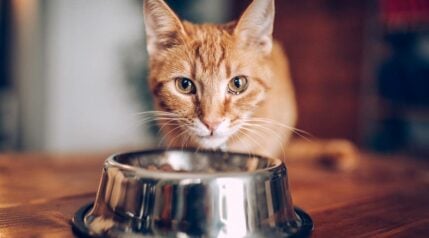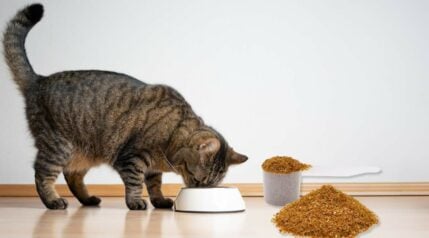When you purchase through links on our site, we may earn a commission. Here’s how it works.
Broccoli is one of those foods people either love or hate. Can the same be said for cats? It is a natural train of thought for owners to wonder if their furry kiddo can eat broccoli, especially since kitties often try to swipe food from our plates. Many folks have heard from various sources that broccoli is unsafe for felines. We discuss the question, “Can cats eat broccoli?” and the risks and benefits.
Broccoli is safe for cats, but only in moderation. Cats will get everything they need from high-quality cat food, so adding foods like extra veggies is not usually necessary. But fresh foods like veggies can be a nice treat as long as they are safe for feline consumption.
Many feline owners may be curious about adding fresh foods to their pet’s diet. Pet parents sometimes may not want food to go to waste or feel that fresh foods are a healthier option. Whatever the reason, it is crucial to know what human vegetables your kitty can eat and which ones can be harmful. Let’s get into the details about cats and broccoli.
Can Cats Eat Broccoli?
The short answer is yes. Cats can eat broccoli. Plain broccoli has no toxic or harmful qualities to a feline. Many cats eat broccoli and other vegetables and enjoy them. That does not mean you should start feeding them this at every meal. However, allowing your kitty to have a little bit here and there will not hurt her and can add some very beneficial nutrients to her diet. It is a fantastic and healthy alternative for kitties who love to eat grass and houseplants. Never switch your kitty to a vegan diet. A few extra veggies are okay, but a plant-based diet will not support their growth or provide enough protein to keep them healthy.
Is Broccoli Good For Cats?
Broccoli is good for felines in limited amounts. It contains many nutritional benefits. Keep in mind that cats are obligate carnivores. They need meat in their diets to stay healthy. However, occasionally adding fresh veggies can give their diet a nutritional boost and be a tasty treat.

Benefits
- Bowel Movements – Broccoli is high in fiber. It can act as roughage for felines and aid digestion and healthy bowel function. It can also help calm an upset feline stomach.
- Heart Health – This green veggie is particularly good for heart health. It can lower cholesterol and reduce triglycerides. This helps lower the risk of heart disease in both felines and humans. It can help clean the blood, help with blood flow, and lower the disease risk.
- Antioxidants – This vegetable is extremely high in antioxidants and is beneficial to humans and felines alike. Antioxidants are compounds that protect the body from cellular damage. Vitamin A and E, beta-carotene, and enzymes like superoxide dismutase and catalase help protect against diseases like cancers and are highly effective in helping treat inflammation.
- Folic Acid – Folic acid is beneficial in producing oxygen, elevating blood oxygen, DNA synthesis, and fat metabolism, and supporting growth and development. It helps form red blood cells, and broccoli is a fantastic source of folic acid.
- Iron – This veggie is high in iron and can give a boost to felines. Iron helps with overall body function. Too much or too little iron is a problem, so be careful not to add too much extra iron to a kitty’s diet.
- Potassium is an electrolyte used to help regulate heart function and plays a role in nerve and muscle function. Too much or too little can cause severe health concerns.
- Vitamin C – Vitamin C can help boost immune systems and fight illness. Vitamin C also helps with the physical healing process and is beneficial in healing injury.
- Other nutrients like B6, Vitamin A, Vitamin K, magnesium, zinc, and phosphorus.
Is Broccoli Bad For Cats?
Broccoli, in small amounts, is not bad for a kitty. Cats are obligate carnivores, and plant food is not part of their natural diet, so it should not replace or make up much of a feline’s diet. Feeding a kitty too much may cause a health issue. It can cause stress to a cat’s digestive system. Symptoms include stomach discomfort, indigestion, bloating, and gas. Commercial cat foods are developed to offer everything a feline needs nutritionally. Adding too much of anything extra, even something healthy like vegetables or fruits can cause considerable disruption to their nutritional balance.
Broccoli prepared for human tastes will have a variety of seasonings. Many of these, like butter or cheese, are high in fats. Onion and garlic are examples of spices that are toxic to fur babies. Vegetables prepared for humans should not be fed to a kitty. Cats eat vegetables, but they must be plain and fresh.
Can Cats Eat Raw Broccoli?
Felines can eat raw broccoli in small amounts. However, it must be cut up into small pieces to avoid being a choking hazard. It may be used as a stand-alone treat or mixed with regular food. This healthy snack can help with their urge to chew on things but should not be a daily treat. It can help deter your kitty from munching on your houseplants.
How To Prepare Cooked Broccoli For Your Kitty
When preparing cooked broccoli for cats, it is best to keep things simple. Flowers and stalks should be cooked by themselves, with no other seasonings. This vegetable should be boiled or steamed. This softens the skin and makes it easier to chew while keeping most of the nutritional benefits. Do not add butter, oil, salt, pepper, onion, garlic, or any other seasonings. It should always be served plain to a kitty and should be cut into smaller pieces. A very small amount of coconut oil is often added for taste to both cooked and raw vegetables.
How Much Broccoli Can A Cat Eat?
It is generally safe for cats to eat a small amount of broccoli as a treat, but it is important to use moderation. Cats do not need to eat broccoli as part of their regular diet, and it should not be fed to them in large amounts. Too much can cause disruption to a cat’s digestive system. A small piece of broccoli once or twice a week is usually sufficient as a treat.
Which Vegetables Can Cats Eat?
There are several vegetables that are safe for kitties to eat. They can also eat carrots, green beans, peas, potatoes (cooked only), pumpkin, spinach, asparagus, green bell peppers, and cucumbers. Certain parts of avocados can be beneficial to felines. Fur babies can also eat some fruits like apples, cantaloupe, bananas, and strawberries. Again, these foods are occasional treats, not regular additives to their diets. Always serve them without other added flavorings or spices.
Personal Experience With Cats Eating Broccoli
“I have two cats currently, but have had over 10 in my care throughout my life. My cats occasionally show interest in broccoli. They are more interested in the leaves, as they often go after houseplants and cut flowers. I have never seen them eat a full piece of broccoli, cooked or raw, but they do like to chew on the leaves. It is helpful to know that the leaves are safe and offer some nutritional benefits. I would rather they eat these than my flowers.”
–Danielle DeGroot, Love Your Cat writer and longtime cat owner
Frequently Asked Questions

Can kittens eat broccoli?
Yes, kittens can eat broccoli. They should be fed it in very small portions and only as an occasional treat.
Is broccoli poisonous or toxic to cats?
This food is not toxic for kitties. However, it can cause some problems if they are given too much. It should only be an occasional treat and not a daily part of their diet.
What about broccoli leaves?
Felines can eat the leaves. The leaves are just as high in nutrients as the stalks and flowering heads. Felines may react similarly to raw leaves as they do to grass. Overdoing it can cause stomach distress and even vomiting. The same rules apply to the leaves, like the flower head and stalks. Small doses are okay.
Is cauliflower safe for cats?
Yes, kitties can eat cauliflower. It should only be served raw, steamed, or boiled, with no added ingredients. It has many of the same health benefits, and some veterinarians believe it has anti-cancer effects.
What vegetables are toxic to cats?
Several veggies are toxic to felines. Green tomatoes, onions, garlic, chives, mushrooms, leeks, and green or raw potatoes. Kitties should not ever eat cherries, raisins, or grapes. Citrus fruits like lemons, grapefruit, limes, and others can cause stomach upset and digestive issues.
Final Thoughts
Yes, felines can eat broccoli! This is a vegetable that is safe for kitties to consume and can even have some health benefits. It is always best in small doses. It can be cooked or raw but should be cut into small pieces. Never use seasonings or human spices. These are often toxic to felines. Always discuss any home-cooked or raw food diets with your veterinarian before making a switch.
Cats should get everything they need nutrient-wise from their kitty food, so adding in things like vegetables and fresh fruits is not necessary. Owners must remember this when they consider adding new food to their fur kid’s diet. Felines need a well-balanced blend of nutrients. Owners should stick to high-quality brands that use natural ingredients. Make sure felines get animal proteins. While feeding your kitty broccoli is a fun treat, try not to overdo it. Feline owners, however, are free to indulge in this tasty treat as much as they like.





